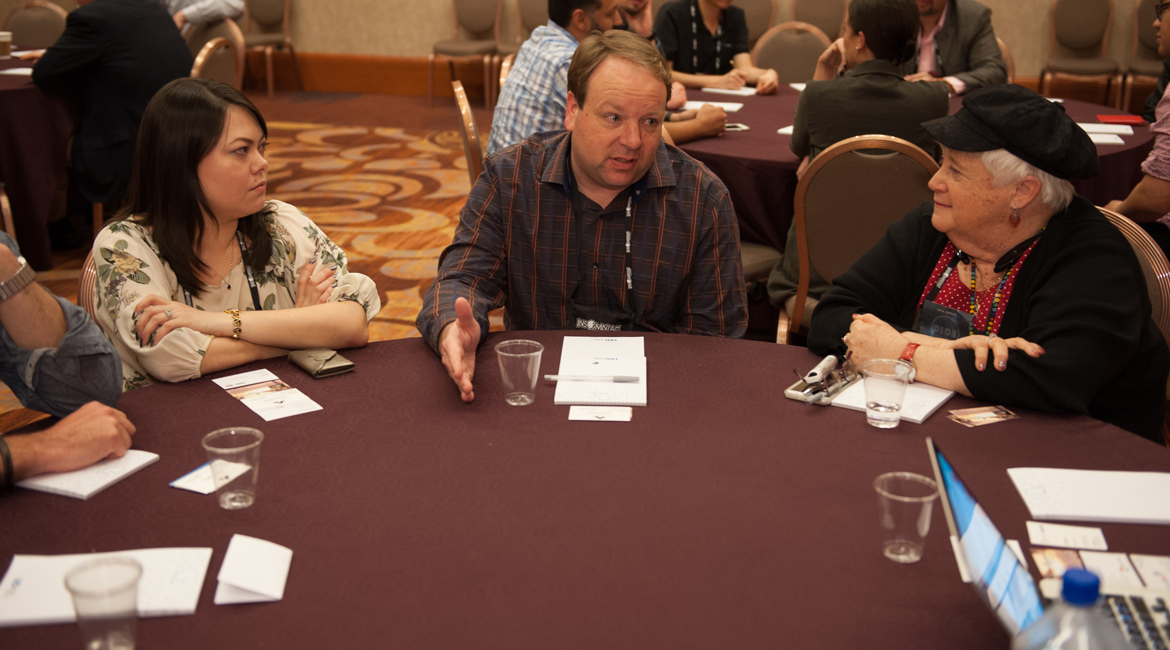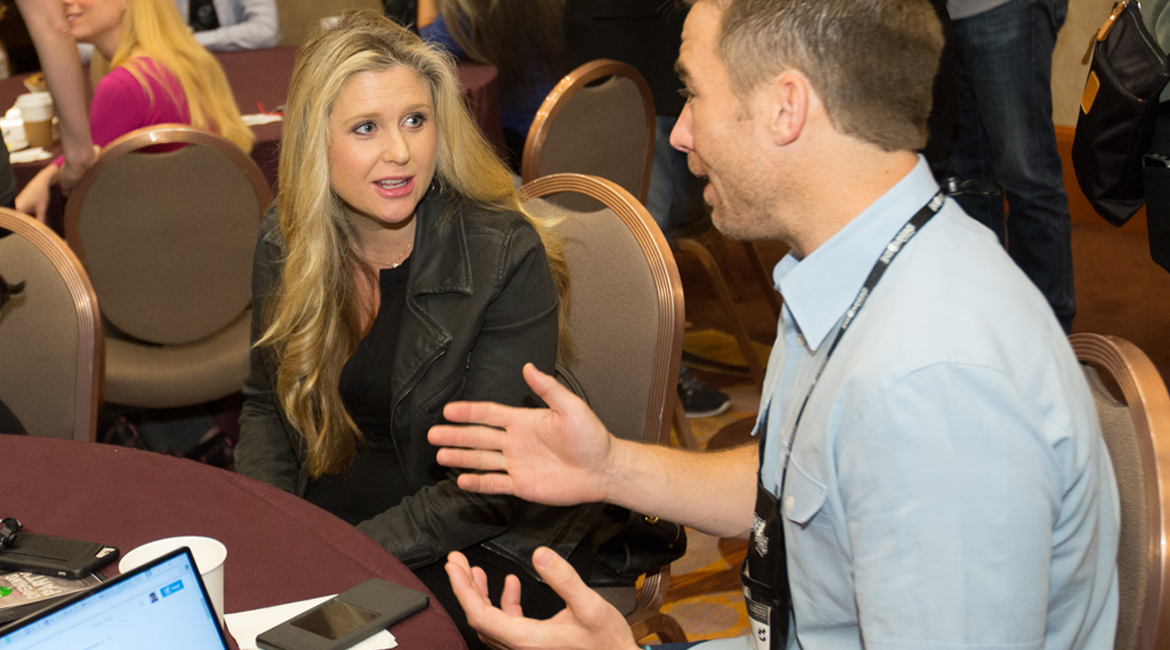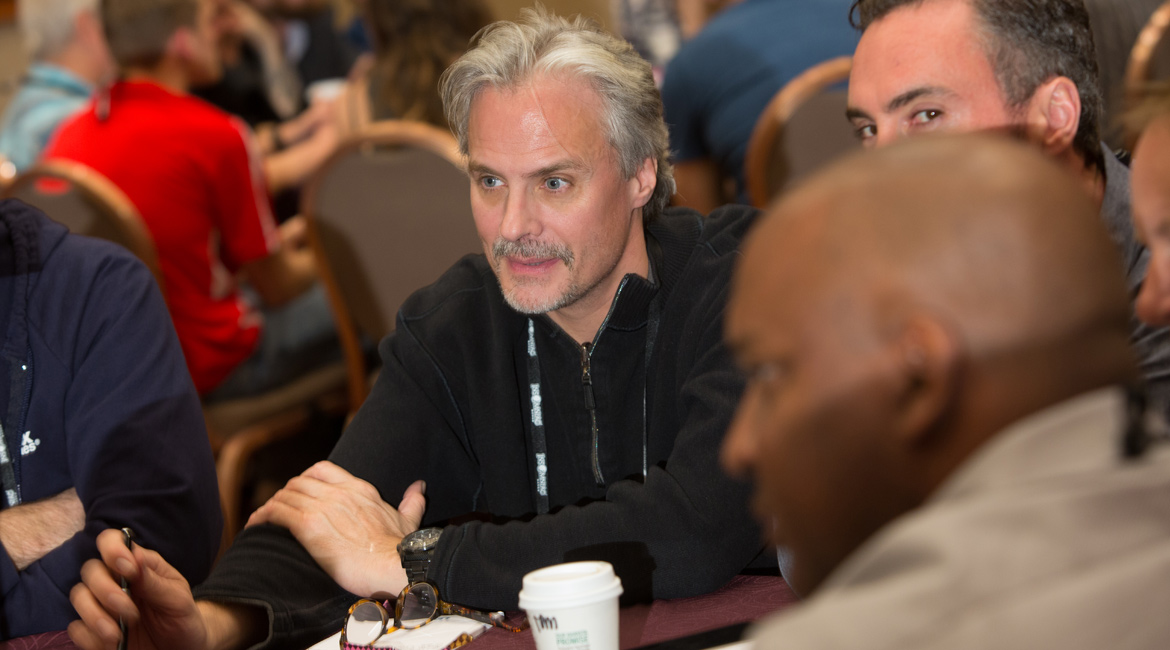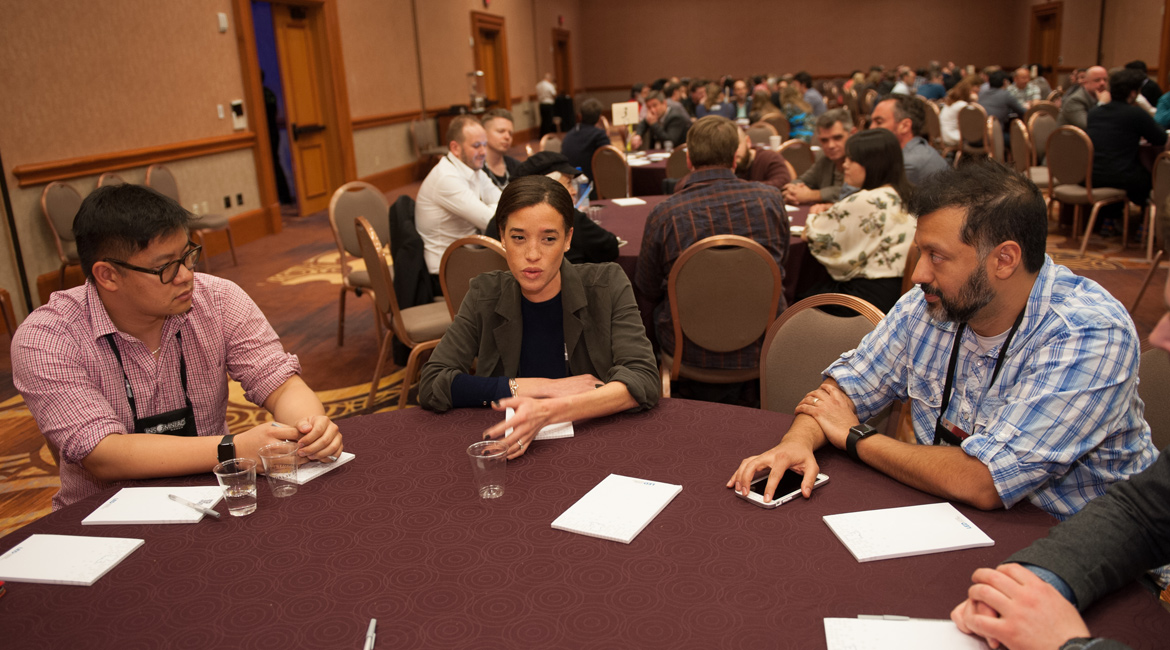
Roundtables
curated discussions with industry experts
2019 D.I.C.E. Summit will once again feature focused roundtable, break-out sessions to facilitate new networking opportunities that will enrich the attendee experience. Sponsored by Virtuos Games, roundtable break-out sessions are intimate, moderated group discourses where attendees can discuss amongst peers a variety of topics important to the interactive entertainment industry. Roundtable sessions take place Wednesday, February 13th.
**NEW: On the day of roundtable sessions, table choices will be first come, first serve. Please have alternative options ready in case your first choice is full.
2019 Roundtable Leaders

Tina Amini
Editor-in-Chief of Games, IGN
How to engage with an increasingly invested community.
The video game community has evolved and expanded. Over the last decade, our audience’s growing voice has translated into an undeniably growing influence that has often impacted developers and even the design decisions they make. That voice has found modern footing online in the form of content creation and social networks that have amplified them and, in turn, affected the opinion of the majority. In 2019, how will we adapt to those higher stakes where messaging is even more convoluted and information spreads (and sometimes distorts) at a relentless speed?

Tami Bhaumik
Roblox, Vice President of Marketing & Community Safety
Is it the Digital Native or Digital Naive? A Discussion on the Video Gaming Industry’s Role in Teaching Good Digital Citizenship
Millions of players, from across the globe, are coming together as a community to engage and interact with others in what everyone envisions to be a safe environment. Unfortunately, the issues of cyber-bullying and inappropriate behavior are a constant and growing concern, impacting users everyday - and the video gaming industry is no exception. For companies investing heavily to build these online communities, the need to educate users and foster responsible digital citizenry is an issue that will only continue to grow. This roundtable will bring together industry leaders to discuss this growing issue, including how the technology industry, parents and young users, along with tools and technologies, can make these digital communities a fun and safe place.

Chris Charla
Senior Director, ID@Xbox
Succeeding in the new world of distribution: Game Subscriptions, Bundles and Discounts
How can we as developers, publishers, and platform holders help maximize value to consumers and creators in a world where physical and digital games sales are no longer the only marketplaces we need to optimize for? Let’s talk about release, support and monetization strategies for the future of games distribution.

Brian Crecente
Variety, Video Games Editor
Rolling Stone, Video Game Writer
Video games and the Mainstream Media
As video games begin to overshadow other forms of entertainment, mainstream publications that once ignored the medium are starting to take notice. What do publications like Variety, Rolling Stone or newspapers look for when covering video games? When do they run a story in print? When do they run one online? What's the difference between a publication using an occasional freelance coverage, having a dedicated video game writer, and bringing on a video game editor. What does mainstream coverage for gaming mean for the industry and what will the path toward that look like? In this session, we'll discuss the expectations mainstream media have as they dive into video game coverage from a more holistic approach, what they view as a win and what their perception is of the industry.

Blair Durkee
Special Projects Consultant for Gaming, GLAAD
Marketing for Everyone: Selling Games to LGBTQ Players
While games have become more diverse over time, marketing trends haven't quite kept up. Even the most inclusive games are still marketed almost exclusively to what’s widely considered the "core gamer" demographic, 18 to 35 year-old straight men. But is this what’s really best for the bottom line? Or are we leaving dollars on the table – and players in the shadows? In this discussion, presented by GLAAD, we'll discuss the benefits of marketing and selling games to an underserved yet passionate group of consumers--the LGBTQ community.

Kate Edwards
Geogrify, CEO & Principal Consultant
An Issue of Leverage: Organized Labor in the Game Industry
While we hear reports of studio closures, layoffs, and working conditions on a regular basis, the past several months have been particularly harsh in highlighting some of the systemic issues facing the still-game industry and how far we have yet to go. As a result - as has long-been discussed - the possibility of labor organizations arising in game development now seems closer to reality than ever before. Come join the discussion around unionization, guilds, legal defense funds, and other forms of worker leverage as we explore the future of the relationship between games management and talent.

Maria Essig
Google AR/VR, Gaming Lead
Moving Mobile AR From Pure Technological Excitement to Commercial Reasoning
How can developers and platforms better partner to make recently publicized technologies, like Mobile AR, truly successful? On the one hand, AR has an established marketplace to work with - Mobile. Developers seem to have everything they need at their finger tips for success - solid number of supported devices; audiences that are “trained” to explore Stores for new content with a form of payment on file; business models and tool sets for development to foster (re)engagement... But mobile AR still has a way to go to be commercially comparable with “traditional” mobile games.
Is success in this market only a question of that “best game”? Or do we just need more time? How can the platforms, who are focusing on establishing these technologies, better support game creators/publishers in this nascent phase?

Robin Hunicke
Funomena, CEO and Co-Founder
Creative Development for VR, AR & Emerging Experimental Platforms
Funomena has a history of bringing its games to emerging platforms, and is currently working on projects for Magic Leap and VR platforms. Robin Hunicke will lead a discussion exploring the unique creative opportunities when developing experiences and games for emerging AR and VR platforms, along with the challenges and inventive troubleshooting required while working on these experiences.

Yves Jacquier, PhD
Ubisoft, Executive Director of Production Studios Services
A.I.’s Game Changing Impact
For years, videogames have relied on A.I. developments to advance, while A.I. pioneers used games as a benchmark to compare how their algorithm performed against real humans for human level decisions. Today, disruptive changes in both areas have created new ecosystems where they not only accelerate their own developments but a new paradigm has emerged where videogames and A.I. are on the verge of having real world implications to positively impact peoples lives in many significant ways. Join Yves in his roundtable to discuss if our world is the next open world.

Perrin Kaplan
Zebra Partners, Principal
360 Degrees: How do PR, Marketing, Social, Influencers and Digital all fit together?
What is PR these days anyway? Is it media relations or much more? Is there a blurred line between it, marketing, social, even influencers? Gone are the days when media coverage was enough, but many companies are lagging in this understanding. Let’s talk about the modern definition of PR and how companies of any size must view efforts from a holistic 360 degree approach.

Gilles Langourieux
CEO, Virtuos
How (and should) emerging hot topic technologies such as Cloud and AI influence the way we design and play games.
The Cloud and AI Advancement – two technologies that are rapidly beginning to influence the way we think about, design, and develop games. They allow for worlds of infinite size/scope as well as the means to populate them with compelling features, details, and characters...but do we really want and need that? Do we have more, or perhaps less expansive worlds that genuinely satisfy players than we did 10 years ago, and more importantly ones that appeal to a truly global audience?

Shannon Loftis
Microsoft
General Manager, Microsoft Studios First Party Games Publishing
Trends in Game Publishing
Did you know that more than 500,000 games were released on Google Play and iOS last year? Did you know that as of September, more than 6000 games had been released on Steam this year, and that more than half of them appear to have sold fewer than 500 copies? How do gamers learn about, find, and engage in games when the marketplace is so very crowded? Now more than ever, making a game is only half of the work. Whether you publish yourself, through a small distributor, a major distributor, or a first party publisher, there is work you *must* do to make your game stand out. We’ll discuss strategies for engaging in a dynamic marketplace, publishing industry trends, new frontiers, and notable successes.

Leanne Loombe
Riot Games, Head of Riot Labs
How can/does the industry balance ethical pricing and monetization design with business needs?
We've all seen the current scandals in the media concerning loot boxes and monetization designs within some high profile games, players are ~rightly~ voicing their concerns over content being gated behind pay walls and governments are worried about unregulated gambling. Are developers concerned about doing free-to-play or pay-to-win models in the current climate? Do players want more traditional box products so they can pay a flat fee and not worry about being pressured into spending more money within the game?

Andy McNamara
Game Informer, Editor In Chief
It’s Better As A Dialogue
Game previews are simply not the same anymore. The access the press gets to games in development is more limited than ever, and that’s not a good thing. Yes, games are more complex. Yes, publishing models have changed with early access and persistent worlds. But at the end of the day, limiting the discussion isn’t helping the dialog between the developer and the consumer that the media fosters. This roundtable will discuss how limiting access can blind-side consumers, create public relations controversies on the eve of release, and leave the media with the wrong impression of what defines a game and makes it special.

Tania Malen
Star Stable Entertainment, COO & CMO
Community-driven Content is a CMO’s Secret Weapon
This roundtable is for marketers and community managers to discuss best practices in converting customers into a vibrant community that fuels marketing campaigns, product development and sales. This approach is especially effective when your customers are the elusive tween/teen market. Let’s discuss how tween/teens are not only consumers; they are creators, producers and legit revenue drivers who can add value to your company, marketing and product.

Frank O’Connor
343 Industries, Franchise Creative Director, Halo
Status, Quo Vadis: Legacy vs Innovation
For games or entertainment franchises with an extensive legacy and history, moving forward can be a perilous task. How do we respect the foundations upon which successful properties are built, while continuing to move forward and bringing those core fans – often the most conservative and vocal – along for the ride? How do we innovate and improve to expand our audiences without abandoning core principles and values and even basic mechanics of initial success? What can science and research tell us that instinct can’t – and when do we use gut feelings and predictions to stay ahead of user research and player data? Join Frank O’Connor to discuss the perils of change, the gravity of fandom and the opportunity of evolution in a world where the value of heritage clashes with the agility of fast-follow and the enormous value of fanbase fealty.

Adam Orth
Gaming Corps, Chief Creative Officer
This Must Be The Place: Creating Location-Based VR Entertainment
Location-based VR entertainment is exploding. Major players are making big investments in VR locations and consumers are responding. From arcades to amusement parks to museum installations, everyone can now experience the magic of VR through entertaining, transportive and meaningful VR experiences outside the home. Adam Orth will lead a roundtable discussion touching on the current market, marrying VR technology with physical spaces and strategies VR developers, studios and publishers can apply to their businesses in order to exploit their original and licensed properties within the LBEVR space.

Kim Pallister
Intel Corporation, CTO – VR, Gaming and E-Sports Group
The Future Of Gaming Platforms, And What It Means For Game Development
In the nearly fifty years that there has been a games industry, change has been the norm. Today, however, we seeing greater and more rapid evolution than at any other time in gaming’s history. From the globalization of gaming culture and markets, the evolution of distribution and delivery of games, the morphing of games into services, to the advent of streaming as an integral part of games, there is a lot of change happening. Combine that with evolving hardware and software, immersive technologies, cloud computing and advances in artificial intelligence, and it’s anyone’s guess as to how games will look in five years and beyond. This panel discussion will solicit opinions and debate on what these emerging trends and technologies could mean for the future of games.

Amir Rao
Studio Director, Supergiant Games
What is Creative Ownership?
As individuals working on game teams, we all want to meaningfully and personally impact the end result, and have real agency over our craft or discipline, if not the project as a whole. How do teams go about balancing product cohesion with individual creative investment? How do we reconcile creative control over areas of expertise with meaningful collaboration? Our roundtable will explore these and other questions as we discuss organizing and directing our teams with an eye toward how creative ownership fits into the picture. We'll exchange processes, stories, and suggestions for fostering authentic, effective creative output.

Jade Raymond
Creating a culture where creativity thrives
When people think about a great creative culture they often think about attracting “Top Talent”. But what does that really mean? Building a great creative culture is about more than optics and fancy resumes. It’s about nurturing the next generation of creative talent and creating opportunities for new ideas to shine. And most importantly, it’s about creating a culture that’s inclusive and supportive. When it comes to creating a environment where creativity thrives, there's no "one size fits all” approach - but there are some key ingredients that can help fresh ideas emerge and allow talent to flourish. Jade will lead a discussion exploring the unique opportunities (and challenges!) that exist when creating a culture from scratch. She will also discuss how existing cultures can be transformed to encourage new ways of thinking. Together we will explore how business objectives impact culture, how to ensure diverse perspectives are heard, and the importance of consistency and defending “risky ideas” throughout the creative process. Jade will draw on her extensive history of building new studios, new teams, and new IP to provide examples of best practices and common challenges.

Andrea Rene
What's Good Games, Co-Founder
The Power of Perception: Managing Expectations of Your Game's Reception
So you want to hype up your game and sells pre-orders like crazy? You'll likely need some influencers, streamers, YouTubers, or games media to help spread the word, but what can and should you showcase that generates excitement without being misleading? What kind of access is not enough or too much? Andrea Rene has been working in games media for a decade with brands like IGN, GameTrailers, GameStop TV, and more. She'll lead a discussion on managing gamers' expectations through pre-launch coverage, and how to work with press and influencers to put your best foot forward.

Ryan Schneider
Chief Brand Officer, Insomniac Games
Say (Almost) Anything: Balancing Studio and Employee Communications
We’ve all seen stories during the last year where employees, studios or publishers clash over what, how or even whether they can publicly address challenging subjects. And there are plenty of thorny topics to choose from; from harassment and discrimination to work-life balance and game features. So, let’s get it all out on the (round) table: How do we establish, explain, evolve and enforce studio communications policy in a volatile and occasionally toxic online environment?

Genevieve St-Onge
Co-Founder, popagenda
Are traditional publishers still relevant?
Exploring the evolution of the developer/publisher dynamic in an increasingly saturated marketplace, democratization of publishing tools and access to agencies. Why is it worth it anymore for developers to sign off part of their revenue? Is it now too much of a risk for publishers to provide funding in an overly competitive market? Can you seek expertise elsewhere?

Caroline Stokes
FORWARD, CEO & Founder
Future-Proofing Your Human Capital
You are attending DICE to create best-in-class experiences, but how about your human capital strategy? Conscious human capital planning is a must to attract and retain the talent you seek to build the product and culture your organization needs to thrive. Join Caroline Stokes, CEO of FORWARD and walk away with new ways to impact your conscious human capital strategy across hiring, crunch-time and down-sizing your operations.

Sibel Sunar
CEO, fortyseven communications
Communications for the Rest of Us
So you have a game/company/product that doesn't have a traditional marketing campaign or doesn't have easy pre-launch hooks. How should you think about PR? Why do it? What do do? Come hear about and share ways to think about communications when you have to get visibility for products and companies that don't neatly fit in traditional press cycles, or don't have pre-launch audiences.

Dean Takahashi
Lead Writer, Gamesbeat
Journalistic sources: Where do stories come from?
When covering the game industry, where do the journalists find their best stories? Should journalists stay close to boards and leaders, like reporters covering the White House or those working for the Wall Street Journal? Or should they listen to gamers and chat with people inside games or on streams? There are many ways to get information. What's the best way to gather it? And how should they be careful about fake news and false leads? How do you talk to journalists when you are a confidential source? How do journalists find great stories? And how do they miss the ones right under their noses?

Tracey Thompson
Assoc. VP, Global Communication, Bethesda
Keep ‘em Coming Back for More: Effective Audience Engagement in the Digital Age
At Bethesda we know that in order to engage players, and keep them engaged in any meaningful way, we have to keep them entertained. Let’s talk about the importance of creating a strong social presence and a voice that reflects your individual brand, how to build (and rebuild) trust with players by talking with fans (not AT them), how to use PR to story-make (vs. story tell), and ways to create compelling content - all of which bridge and bolster tentpole assets and most importantly, keep them coming back for more.

Sean Vanaman
Game Developer, Valve
Video Game Development Conundrums
Every video game project is a collection of creative and technical trade-offs. In this round-table hosted by Sean Vanaman from Valve you'll tangle with a collection of implausible, outrageous conundrums in an attempt to discern what's most important to you about making video games. Conundrums include: Would you rather work have to work on a game for ten years with a team of three or work on a game for one year with a team of thirty? Or, more diabolically: would you rather be forced to give up the use of your preferred game engine or give up the use of Google?

Kelly Wallick
CEO and Founder of Indie MEGABOOTH, Chairperson of Independent Games Festival (IGF)
Curating for the Future - How Discoverability and Audience Diversification Shapes our Industry
It seems everyone has an opinion on how to address the curation and discoverability issues arising from high volume, open platform distribution. So what's working? What influence does how, and who, we curate for affect the overall landscape of the gaming industry at large? How do we find and retain the diversity of audiences needed to create and grow a healthy ecosystem? What methods can we use to connect these audiences with new and emerging content? This is especially important on the fringes of the independent scene, but the ripples can be felt in both big and small studios across the industry. Join Kelly as she facilitates a conversation around the quietly influential role of curators, tastemakers and the big and small decisions that will shape the future of gaming.

Vince Zampella
CEO, Respawn Entertainment
Making Games at Respawn
At Respawn it's important to us that our developers can own their work and be encouraged to challenge what's expected, iterate and take risks. This can lead us to unexpected and sometimes chaotic places, but also where we find great gameplay. Vince will lead a discussion with attendees why Respawn focuses on putting gameplay first and the balance of taking risks while staying on track.
testimonials from roundtable leaders

"The roundtables at D.I.C.E. 2016 let me connect with a bunch of great people, some of whom I met for the first time along with colleagues I have known for many years. The format let us talk and move the conversation into areas that mattered to us, and really helped me get some insights into how my peers are thinking about issues affecting our industry right now."
- Feargus Urquhart, Obsidian Entertainment CEO

"D.I.C.E. roundtables are a great way connect at a much deeper, more engaged level...you get to the meat of a topic quickly. I find comparing notes and real world experiences among 8-10 industry peers leads to helpful, actionable takeaways."
- Laura Naviaux, Daybreak Games Chief Publishing Officer
testimonials from roundtable participants

“The D.I.C.E. roundtable sessions have proven incredibly valuable and are now a cherished portion of the Summit where I look forward to participating. It’s such an extremely rare opportunity to have point blank discussions with luminaries who are all seeking greater answers, yet are already at the top of their game. Priceless.
- Lorne Lanning, Oddworld Inhabitants CEO

“I heard great things about the roundtables at D.I.C.E. Europe and was curious to see how the event would scale at the Summit in Las Vegas. The sessions exceeded my expectations. They were engaging, informative, and fun. It gave me an opportunity to discuss topical issues with peers who could offer a fresh perspective.”
- Kyle Kennedy, Six Foot Executive Director of Publishing
